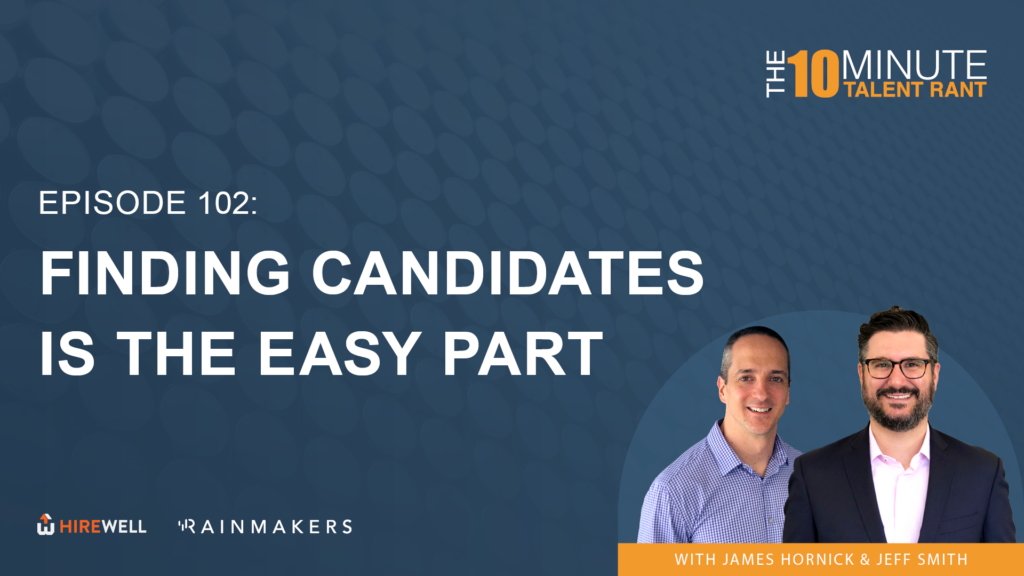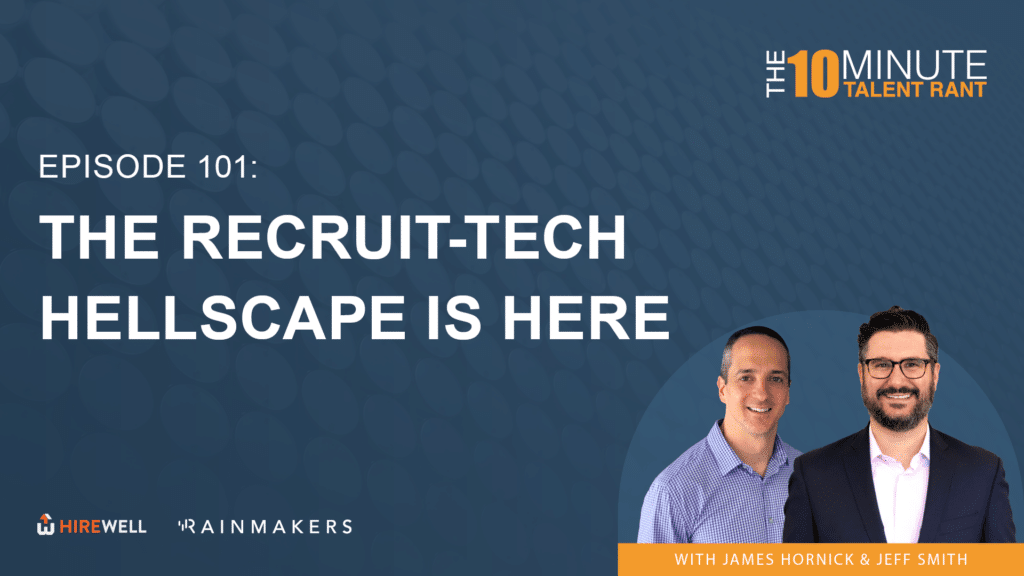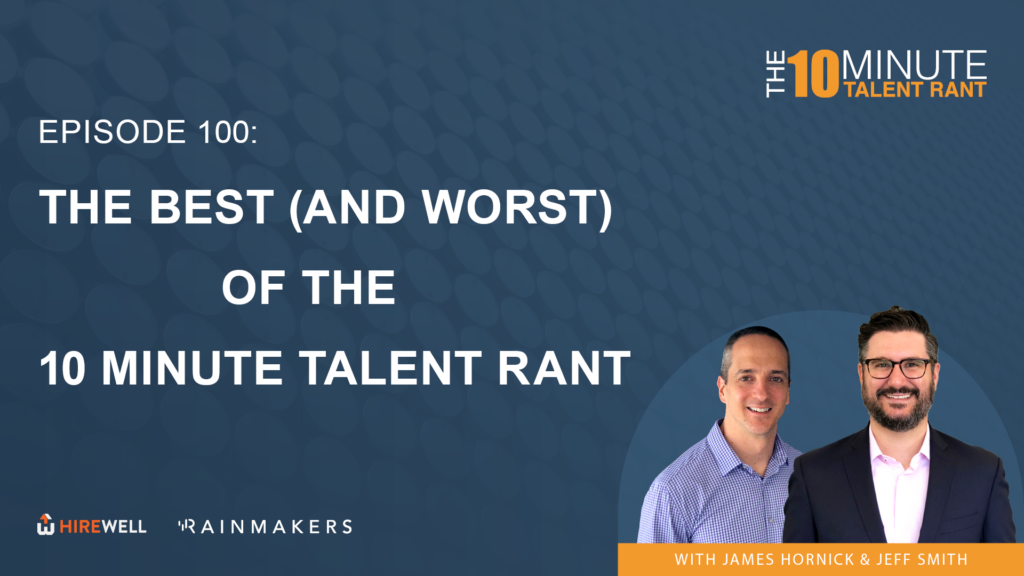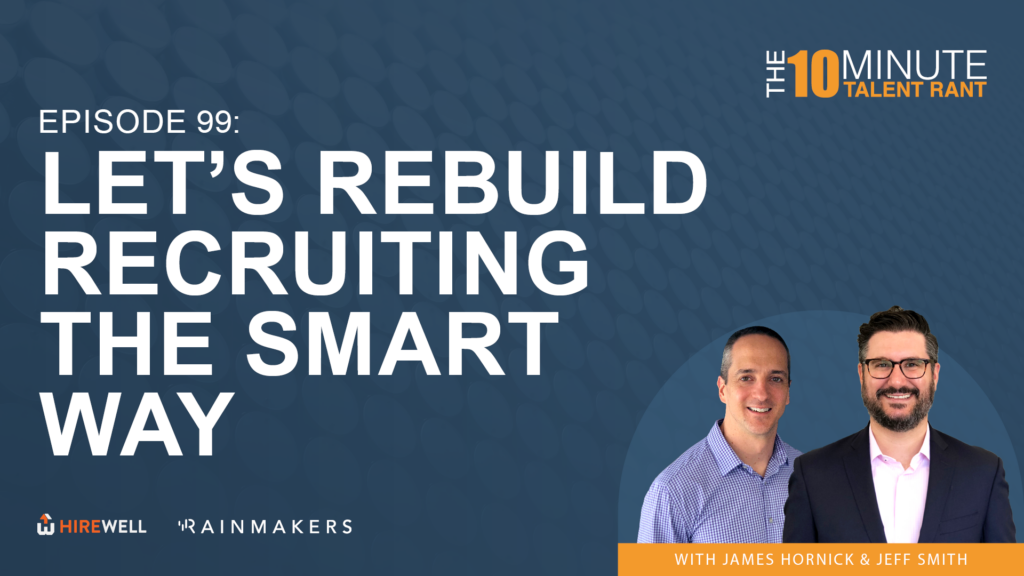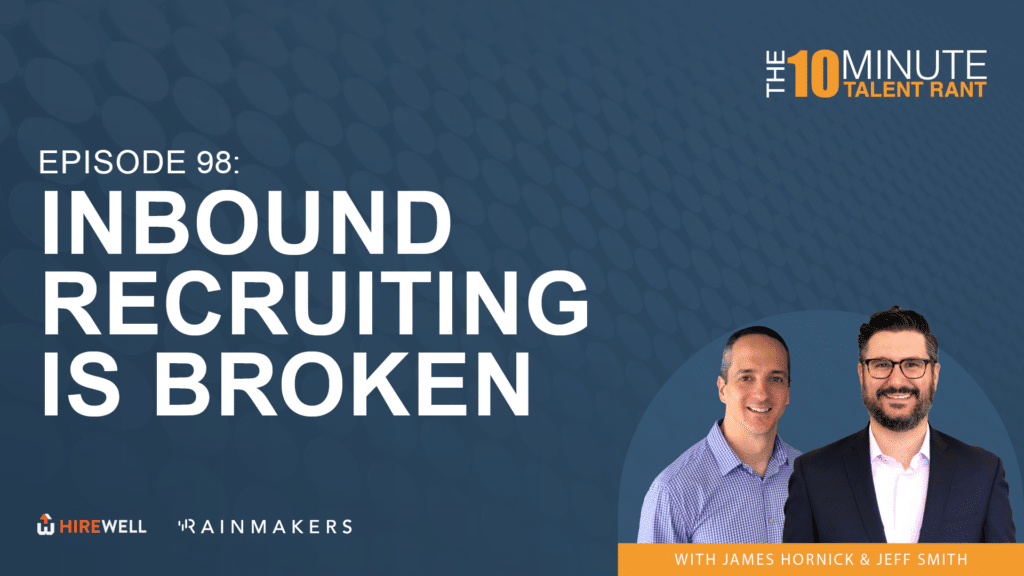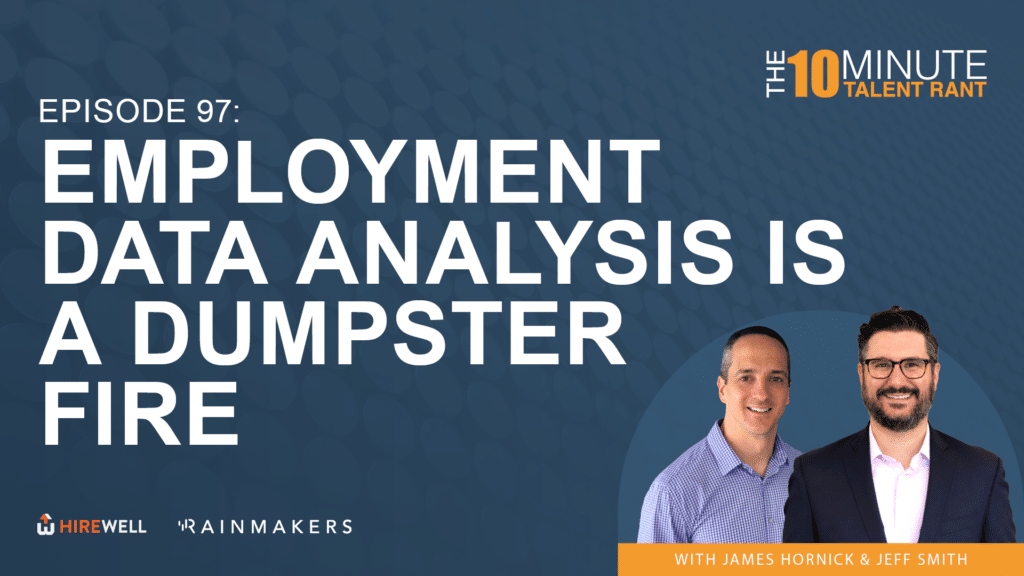The 10 Minute Talent Rant is live. I’m James Hornick, joined by Jeff Smith, and we are on the clock. The 10 Minute Talent Rant is our ongoing series where we break down things that are broken into talent acquisition and hiring space, maybe even pitch a solution or two. Before we dig in, all of our content can be found on talentinsights.hirewell.com
This week’s topic, episode 69, hiring shouldn’t be an experiment Also, everything’s broken right now in the talent acquisition space. Yeah, everythings-
There was a plethora of things to choose from this week. Yeah, we have a lot. So, my biggest concern is that we’re just totally backsliding. Like, the 2021/2022 boom wasn’t just good for the hiring economy was also good for like, just companies got their shit together.
I felt like at that point in time, places were moving with purpose, processes were streamlined. They understood the need to sell value. Hiring leaders were very involved in the process. They were bought in. The messaging was good. Decisiveness was probably the biggest thing. Yeah. And I don’t like the concept of like, it’s a job seekers market versus a hiring company’s market.
I’ve never really bought into that idea. It’s all one market. I like it when it’s an efficient market. You got both sides acting like adults. A whole do unto others thing. All that fun stuff. But I don’t think it-
it doesn’t work in a vacuum. Like when one side breaks down, both sides break down. What are we seeing, Jeff? Yeah. Also side tangent when people say, or, you know, we’re out there editorializing that this is a job or hiring company’s market, it’s inherently not true. And then it, like, kind of exacerbates all of these conversations that we’re going to kind of bring up because companies and hiring managers are like, “Well, why aren’t the candidates behaving like I want them to behave?” Well, we’re going to tell you.
Here’s what we’re seeing. So first and foremost, let’s go data driven storytelling submissions to placement ratios are completely out of whack, right now. It’s been really weird. Historically speaking, you probably look at a six to one for industry vets. 2021 actually lowered to five to one. Which doesn’t seem like a lot, but one point in a six point scale is a lot, in the grand scheme of things. You’re just, you’re getting a lot more deals for less submissions. In 2023, this year it’s been seven and a quarter to one like a precipitous decline. And these are real numbers based on our data, just so everyone knows. Yeah, yeah. Yeah.
So a few things are contributing to this. There’s like, so the return of the ever, the shapeshifter. The shifting requirements. It’s an oldie but a goodie. Let’s do four interviews and then be like, eh, this isn’t the job we want to work on. Like, we’re going to totally change the job. Great. Number two, just the tried and true, let’s find reasons not to hire. We covered it a couple weeks ago. One of the best examples is reference checks. Like finding reasons to not hire somebody based on somebody you don’t know, in their opinion. Three, just simply straight up ghosting people. Yeah. Sucks. I don’t think we have to go any further. Four, the final stage, knockouts. Everybody’s in love with this person. They do a 10 minute interview with the CEO and the CEO is like, “Nope. Comm skills weren’t there. Pass. Next.” We’re in an employer’s market. Doesn’t matter what the other five people said. Yeah, no.
And finally, just like the length of time that it’s taking for anyone to get any sort of feedback whatsoever. I think it’s because there’s a diminished amount of internal corporate recruiters who are actually doing a lot of that communication. That’s completely a side tangent. But after we are initially submitting resumes or candidates are submitting resumes to internal or to the postings, no one’s hearing anything. Here’s the kicker. These are the exact same trends we saw in 2020. Right in the middle, like the covid meltdown. It’s like we’re just,
it’s just like Groundhog Day. Like everything’s just happening all over again. Everything was terrible. Then everyone got everything together and then it’s just all falling apart again. And I don’t think when companies backslide and their hiring processes, that doesn’t live in a vacuum either.
Like they’re undoubtedly backsliding their day to day and how they run the organization. This past week, and this is still kind of on topic, I was talking online about like Gallup State of the workplace poll that came out like in mid June. It was like 99 pages, 160 countries, 160,000 people kind of surveyed.
Quick stats on this one, only 31% of US employees are engaging their work. Cool. The other, the other 69 are either like quiet, quitting, or actively less like trying to sabotage the place. Crazy part that’s actually better than the rest of the world. In Europe, it’s only like 13% engagement. 52% of US workers feel stressed, a lot of the day. And 47% intend to leave their job.
I’m going to go out on a limb and say like all these, like how bad these numbers are and like these sound, it’s not just like happening in the interview process. It’s actually happening how companies actually are managing things day to day. So like half your company wants to bounce, they’re stressed out, like what’s actually waiting for them when they start the job seeking process at that point, right?
It’s happening. It’s 100% happening. So, on that side, I mean, here’s kind of what we’re seeing. This isn’t us, this is literally the stories that we’re hearing from job seekers. So like overarchingly, the fatigue is real. There’s too many high quality candidates that have been let go or don’t have work anymore.
And they’re applying to jobs and going through these long processes only to find out that, just like I said at the beginning, jobs are shifting, they’re getting canceled. They’re fundamentally changing in some way. Look, the only way to read that from the candidate perspective is you don’t know what the f*** you’re looking for.
There’s no other real explanation for it. Again. Like, I don’t even want to say it’s an employer’s market, but let’s, for the sake of this, say yes, definition wise, it’s an employer’s market. But good talent still and will always, for the rest of time need to be courted. Yes. They don’t need to leave their current role, and if they are looking, they’re good enough to have options in all markets. Fact.
So just a scenario interview one goes well. There’s some follow-up questions, here’s what to prep for. Some of it, like candidate side sounds like a reach. But as a candidate, I’m like, all right, I’m interested enough to continue. This doesn’t seem like too big of a lift. Interview two goes well, but now “Oh, cool, there’s like a case study or a homework assignment,” or-
That wasn’t planned by the way, which we’ll get to in the takeaways. You know, some stretch skill is added where it’s like, we’re really looking for somebody with like high level visualization in Tableau.
And it’s like, well, that wasn’t mentioned at all in the interview process of the JD. And then, candidate does it all anyways. They’re like, you know, this is- I’m a little annoyed, but I’m desperate enough. Right? I want to see this thing through. Hannah does everything that they need to do and essentially, the company says even after the third interview, “Nope.”
You’ve probably just validated that this is absolutely not what we’re looking for. Meanwhile, the candidate’s gone through five hours of their time with multiple people. Your company has gone through five hours of time with all of those people that, you know, there’s a time investment, and the bottom line is no one in this equation wants their time wasted.
So everyone’s fed up with it. We need to stop doing this. Like when candidates string a process along and ask for absurd salaries and wait to ask all of these questions at the end of the line. The hiring team, rightfully so, gets miffed. It has to work both ways. Yeah. And you talk about fatigue, I just learned this week, willpower fatigue. Also known as decision fatigue. It’s a real thing.
It’s like when people try to do the right thing and make good decisions and good choices every day, but it still doesn’t get them anywhere. They eventually lose the ability to keep going and they start just saying F it to other things going on.
When you see burnout, job seeker, or even kind of to your last point when you see maybe your own employees getting burned out because they keep interviewing people over and over again, that don’t go anywhere, the position still don’t get filled, that’s what’s happening. And on the job seeker side, sometimes they’re focusing on the wrong things.
Sometimes they’re not professional job seekers, so how would they know? Sometimes they’re getting misled by online hucksters telling them to do all kinds of stuff that doesn’t get them anywhere. But the biggest chunk of that is like, sometimes companies just wasting their time and their employees time on this stuff.
Yep. Nice guys finish last. It sucks. Yeah. So what are the takeaways? Just advice. Set clear guidelines, employers, on what the interview process is going to look like and what to expect. It is the single most important way to illustrate, to the candidates that you’re speaking to, that you have your shit together. And just let ’em know what’s going to happen.
And if you deviate from it, you’re going to have some exposure, but at least you have a talk track to talk about why you’re deviating from it. Anybody who puts that pen to paper, any company, you’re holding yourself accountable to it, and it goes a long way to building a candidate’s trust. Number two, stop posting recs for data collection.
Stop it. It’s messing up government data, which everybody’s using, to use for data as it relates to the health of the market. Which then becomes the single biggest contributor to compromising what market we are actually in,
in the first place. It’s a mess. If you don’t plan on hiring, please stop posting jobs. Full stop. The last thing I’ll mention is that Gallup Post or that Gallup poll, that was all average data. So I did want to highlight things like the “best companies” with engagement are at about 70% engagement rate. So multiple times higher than kind of what everyone else is. I, 100% promise you, those companies that are treating their employees well and have high engagement rate and everyone’s- they’re actually doing all these other things well too. Absolutely.
These things, a third time, I’ll say it, it doesn’t live in a vacuum. The companies that actually have good engagement, have people really excited about working at the company, it all starts with how they run their renewer processes, whether it’s through good times or bad.
We are short on clock. That is a wrap for this week. Thanks for tuning in The 10 Minute Talent Rant, part of the Talent Insights series, which is always available for replay on talentinsights.hirewell.com, as well as YouTube, Apple Podcast, Google Podcast, Spotify and Amazon.
Jeff, thanks again as always. Everyone out there, we will see you soon.







